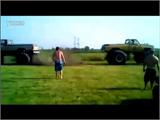Gray tiles and blue bricks
The little river in our hometown leaves us with endless memories and pursuits. For decades, the joys and sorrows of our childhood, as well as many aspirations, seem to still ripple in the shimmering waves of the small river. Now that the village has set up several factories, smoke surrounds the air above the dunes, wastewater gurgles and flows, and the small river is as if covered by a layer of oily black gauze. People dare not go down to the river in summer, cannot hunt in winter, and children can no longer find endless fun by the riverside. Modern life is full of competition, and people in the city generally feel a bit depressed and lonely. Therefore, everyone longs to go to the countryside for fishing and picnicking, completely relaxing without any pretense or scheming, looking at blue skies and white clouds, listening to the sound of flowing water under the bridge, and enjoying the boundless rural charm. However, the beautiful scenery of the city is also eroding day by day.
Whenever the spring rain drizzles continuously, the cries of water ducks tell people the hurried footsteps of spring. The fine rain sticks to our faces like dust, cool and refreshing. After a few days, the grass on the riverbank becomes lush and green, like a carpet spread out. The young girls compete to pick all kinds of wildflowers, walking through alleys and leaving behind a trail of fragrance. In the heavy snow, we dig fish and shrimp from beneath the piles of water calabashes, watch hunters capture wild rabbits in the snowy grasslands, sometimes helping to encircle and chase them, and who knows, we might even receive a reward. The most exciting moment is watching the bride's boat. Before the boat arrives, firecrackers start to explode, and both adults and children rush to the riverbank. Both the bow and stern of the boat are decorated with red paper, and the bride is covered with a red veil. We chase after the boat and shout along the way. Thinking about it now, though those words were a bit vulgar, they did express our joy and yearning. Occasionally, we would get some candy thrown from the boat, which we would keep warm in our pockets for a while before daring to eat. It is said that eating it makes one grow faster, and one will surely marry a fat wife in the future.
In the afternoon of winter, the cold wind combs through the lean willows by the riverside. I have spare time to return to the countryside for a few days. Looking at the rural scenery in front of me, I uncover countless childhood wild interests buried in my memory, making me feel inexplicably melancholic and reflective.
With blue bricks and gray tiles, green trees casting shadows, a clear stream flows in front of the house, the long embankment stretches alongside, and dozens of households sit high on the mound. At a glance, it looks like a distant ink painting. This is my hometown.
With high skies and light clouds, autumn winds rise suddenly. Wild chrysanthemums in red, yellow, and purple decorate the riverbank in a variety of colors. Large boats loaded with the fruits of bountiful harvests shuttle back and forth. The men steering the boats occasionally sing a few segments of model operas, illuminating the entire autumn scenery. As night falls, amidst the scent of rice and croaking frogs, we begin catching crabs. Stars shine brightly, night breezes ripple, and the thatched houses stand beside the water and slopes. A kerosene lamp hangs from the roof beam, swaying with the wind, its shadow lengthening and shortening. Beside the house, there are piles of rice straw ropes, as thick as bowls, smoked black and emitting a strong burnt aroma, used as crab bait. Placing them into the river and pulling them across both banks, after finishing all this, Uncle Si, who catches crabs, leisurely fills his pipe with tobacco, the firelight flickering red and dark in the pitch-black night. We sit by his side, silently admiring, each monkey-eager. Soon, we hear the crabs crawling on the straw ropes. In the morning, when we open the crab basket, the crabs inside are sluggish yet plump. Back then, eating crabs was truly a simple pleasure.
That night, I dreamt of the riverside of my childhood, dark and verdant, with a small boat gently swaying eastward, floating past the curved and mirror-like small river of my hometown...
After summer begins, morning mist disperses, and fish like to leisurely swim and bask among lush water plants. We hold fish spears, thrusting them forward, with a bright white fish struggling on the spearhead. Under the blazing sun, we climb tall locust trees to catch cicadas, tiring ourselves out while waiting by the water pump. Digging a pit on the riverbank, we set up a pot, burning two fires, and a whiff of wild fragrance wafts towards us. When stiflingly hot, calling friends to jump into the water, sitting on the stone slab dock, tiny shrimps and fish lightly peck at our toes. The most interesting thing is finding clams. Back then, our family was poor, and my mother allowed us to find clams to satisfy our hunger. With the fiery sun almost sitting atop everyone's head, we, a group of seven or eight, push wooden buckets, following the docks outward along the river searching for clams. Sometimes, bad luck strikes and shrimps and fish jump into the bucket. Upon encountering pearl clams, several friends must dive to retrieve them. Meeting companions from neighboring villages, we discuss matters. After one trip, the gains are substantial, and the delicious taste of clams lingers around the mound for days. Busy people, after a hard day's work, move a bamboo stool to the riverbank, fanning themselves with old palm fans to cool off. Elders pour a cup of wine, savoring it in the breeze, telling stories that make us stretch our necks like duck heads until we fall asleep in our mothers' arms...
The little river in our hometown was our paradise during childhood.



